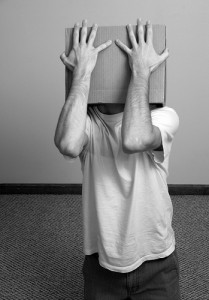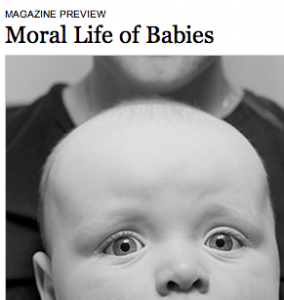
I came across an interesting little tidbit at inCharacter (“the journal of everyday virtues”; I, of course, prefer my virtues to be offered on a sub-weekly basis, like a housekeeper). Entitled “The Death of Embarrassment,” it is an essay on how shame, embarrassment, and scorn have become degraded social values in today’s culture. This, apparently, like all that rap noise and reality television, is something that must be countermanded.
Now I should be fair to the author, Christine Rosen, who goes to some lengths to define herself out of what is, at first glance (and maybe second), a silly position to take:
Many people see the decline of embarrassment as a good thing. “Why shouldn’t I be able to do X?” people often say after having done something outrageous or transgressive. But this misunderstands the distinction between embarrassment — a mild but necessary correction of inappropriate behavior — and shame, which is a stronger emotional response usually involving feelings of guilt about more serious breaches of conduct.
So, embarrassment and shame have been excised from each other, not effectively in my mind, but at least for the purposes of the essay. They aren’t merely ethical gradations on the spectrum of punishment inflicted on individuals for non-normative social behavior—they are two totally different things. Fine, I’ll give her that.
But she loses me when she makes the stock move toward blaming popular culture as the reason for the lack of crimson cheeks:
What used to cause embarrassment now elicits little more than a collective shrug. In our eagerness to broadcast our authentic experiences and have our individuality endorsed, we reject embarrassment as if it were some fusty trapping of a bygone age. But we haven’t eliminated embarrassment; we have only upped the ante. “Your slip is showing” used to be the most embarrassing sartorial faux pas a lady could commit. Now we regularly witness “nip slip” from female celebrities whose shirts mysteriously migrate south during public appearances — or during Super Bowl halftime shows. As the boundary between public and private has dissolved, so too has our ability to distinguish between embarrassing and appropriate public behavior. The result is a society often bewildered by attempts to impose any standards at all.
This is the sort of condemnation that every generation puts forward about itself—radio fried our brains, television shortened our attention span, email killed letters, text killed email, God is dead, the terrorists are winning. Are these things untrue? Probably not. But the instinct to blame “society” for social ills is weak. These are always the worst of times, and people have been savages since man first stuck a bison bone through his nose to worship God.
Rosen then makes the stab at a prescriptive solution—save the babies:
Unlike many other emotions, embarrassment must be learned. Infants know nothing of this emotion, and parents often use the threat of embarrassment to teach young children correct and incorrect behavior: “If you say that in public, you’ll embarrass yourself,” we say to the toddler with a penchant for scatological chitchat. Embarrassment is also a social emotion; its occurrence requires the real or imagined presence of others. Belch at a dinner party and you will likely feel embarrassed; do it while home alone and you’re unlikely to feel abashed. Because it is a learned behavior grounded in social relations, embarrassment is a kind of barometer for a society’s notions of civility.
I don’t know what playgrounds she’s been hanging out in, but the Internet has not lessened this kind of parenting. It remains alive and well, even in the finer schools that won’t be accepting my crotchfruit come this fall.
She then concludes, as will I, with a nod to SCIENCE:
In fact, as the science of embarrassment suggests, it is part of what makes civility possible. In Behavior in Public Spaces, published in 1963, sociologist Erving Goffman described our public actions, from greeting friends on the street to answering questions posed by strangers, as signals of the strength of our commitment to our social communities. “What the individual thinks of as the niceties of social conduct,” Goffman argued, “are in fact rules for guiding him in his attachment to and detachment from social gatherings.” These are what mark us as belonging, or not. “More than to any family or club, more than to any class or sex, more than to any nation, the individual belongs to gatherings, and he had best show that he is a member in good standing.”
Well, if the “science of embarrassment” says it, it must be so.


